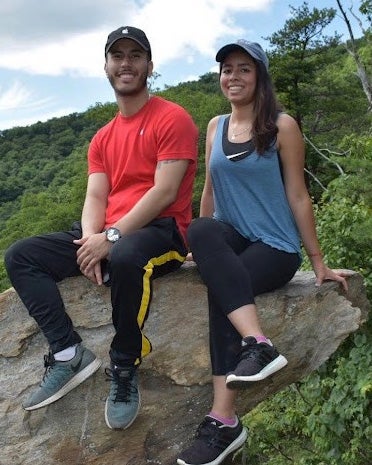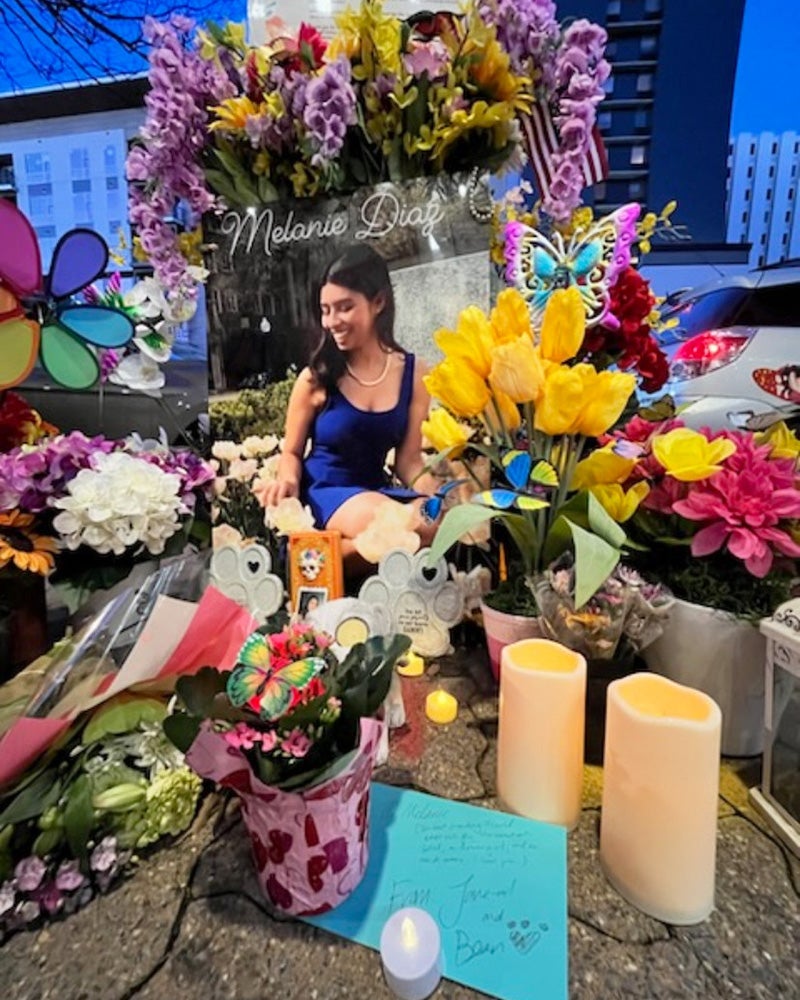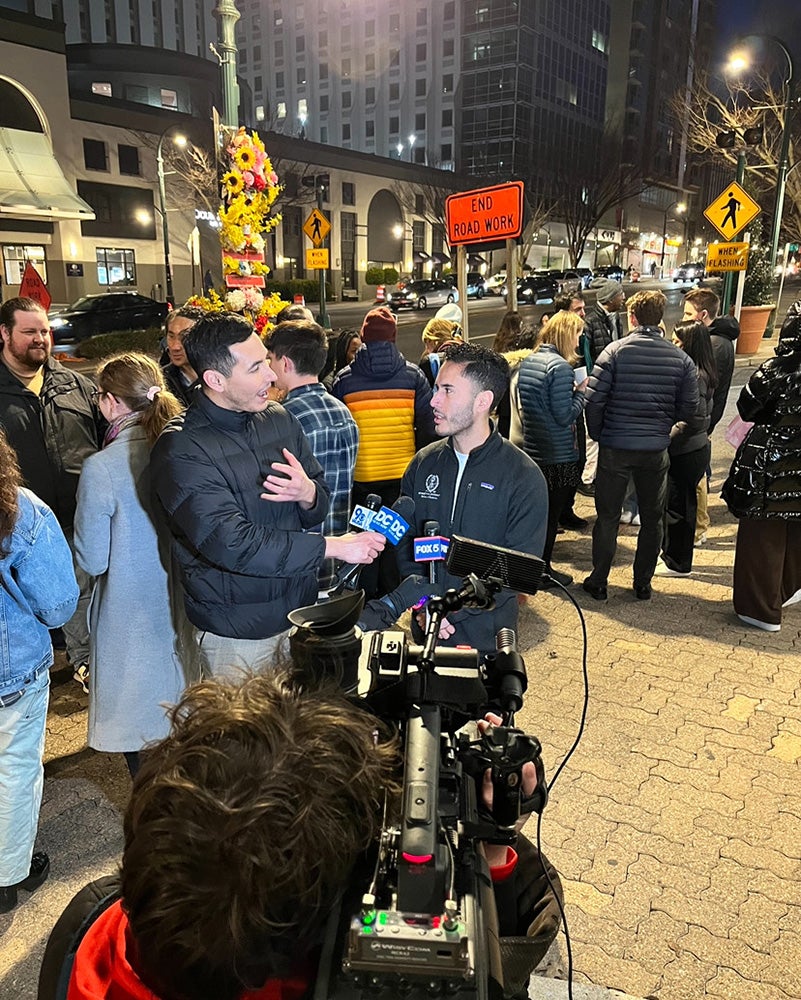How a Medical Student’s Tragedy Drove a New Law To Increase Fire Safety in Apartment Buildings
Posted in News Stories | Tagged advocacy, GEMS
(June 14, 2024) — Michael Sobalvarro (C’16, M’27) expected to spend his year in the Georgetown Experimental Medical Studies (GEMS) program alternating between intense studying and relaxing with fiancee Melanie Diaz (SFS’20) and their two dogs.

Sobalvarro’s plans for the school year drastically changed when a fire broke out in Diaz’s Silver Spring, Maryland, apartment building in February 2023 and ultimately claimed her life. Despite the unimaginable grief, Sobalvarro spent the next year advocating for increased fire safety protections in apartment buildings to prevent future loss of life. His work paid off. This month, a new law took effect in Maryland: the Melanie Nicholle Diaz Fire Safety Act.
“I had to bury Melanie while studying for exams,” Sobalvarro said. “I wasn’t really eating, and I think the only way I was able to make it through was because of the kindness of my fellow GEMS students, who would make sure I had something to eat and even let me sleep in their houses because I was having such a hard time sleeping at home.”
Diaz, who grew up in Florida, graduated from the Walsh School of Foreign Service with a culture & politics major and environmental studies minor. She was a dedicated member of the Georgetown community, serving as a coordinator for the New Student Orientation and taking an active role in the Georgetown Scholars Program (GSP). After graduating, Diaz worked at the Aspen Institute in Washington, D.C., as a program assistant for the energy and environment program.
Diaz and Sobalvarro connected over being first-generation college students at Georgetown with immigrant parents. The two met through GSP when Sobalvarro was finishing his undergraduate studies and Diaz was beginning hers.
“I just remember her having the sweetest personality and being very sincere, very kind,” said Sobalvarro. “She was also very passionate about women’s health and climate change.”
Learning About the Fire
The fire broke out in Diaz’s apartment building on a Friday evening, the day of their sixth-year anniversary. Sobalvarro recounts being on campus Saturday morning studying for upcoming oral exams when he received several calls from Diaz’s mother in Florida.

“There were too many calls for there not to be something wrong,” said Sobalvarro. After stepping out of a review session, he called Diaz’s mother, who informed Sobalvarro about the fire that occurred overnight.
Sobalvarro immediately grabbed his things and headed to MedStar Washington Hospital Center, where Diaz was taken for her injuries. While on his way to the hospital, Sobalvarro learned from her family that Diaz had died.
“I stepped outside of the car and remembered the birds chirping and the sun shining and realizing it was such a beautiful day and how incompatible that was with what just happened to Melanie,” said Sobalvarro.
Sobalvarro, who lived only a few blocks away from Diaz’s apartment, decided to visit her building.
After walking past fire trucks and first responders, Sobalvarro entered the apartment building and asked to speak to the fire officials about what happened. At first, Sobalvarro didn’t notice any visible fire damage until he took the elevators up to the 11th floor where Diaz lived.
“The 11th floor was dark and charred, but when I arrived at her unit, it was clear and bright as day; it wasn’t making any sense,” said Sobalvarro. A fire official escorted him to a staircase where they had found Diaz’s body after she suffered from smoke inhalation.
“In the stairwell, I kept finding her stuff: her Georgetown Hoya keychain, a flashlight, a North Face hat she loved, her shoes,” said Sobalvarro. Fire officials found Diaz’s body several flights down from the 11th floor, swaddling her two dogs.
“She died hugging our two dogs, taking her own jacket off and covering them to maximize their chances to live,” said Sobalvarro.
Asking Questions
Sobalvarro, along with Diaz’s family, is still trying to piece together what happened on the day of the fire.
“The investigation was inconclusive as to what exactly started the fire,” said Sobalvarro. Investigators determined it started in a unit on the seventh floor where the door to the unit had been left open, which allowed the fire to quickly spread. “The firefighters I spoke with described a total inferno in the building — pure blackness with temperatures reaching 120 degrees.”
Sobalvarro discovered that the unit in which the fire began did not have a fire alarm, and that the smoke detectors in the seventh floor hallway did not work properly, despite the building passing state and local fire inspections just weeks before. A resident on a higher floor reportedly noticed the smoke and pulled the fire alarm after the fire had spread for a considerable time.
Working fire alarms and the presence of a sprinkler system in the building would have helped to mitigate the spread of the fire and possibly saved Diaz’s life. Four people were also injured in the fire.
‘I Turned My Pain Into Advocacy’

Sobalvarro and Diaz’s family set up a vigil outside of the apartment building to keep Melanie’s memory alive in the days following the fire, which Sobalvarro maintains to this day.
“For the vigil, we printed out a large image of Melanie, along with a story of the fire,” said Sobalvarro. “The site was a place to mourn, but also became this space to put pressure on the building and the investigations about her death.”
Despite Diaz’s apartment building marketing units as having “updated chef-inspired kitchens” along with building amenities including a gym with an outdoor track and rooftop pool, the high-rise apartment building legally operated under Maryland building codes that allowed properties built before 1974 to forgo retrofitting their buildings with sprinkler systems until 2033.
“Seeing the contrast with how the building marketed itself as having new luxury apartments but didn’t have a sprinkler system really made me angry,” said Sobalvarro. “I started to turn my pain into advocacy.”
Melanie Diaz (SFS’20) and Diaz’s family got to work passing the Melanie Nicholle Diaz Fire Safety Act (HB 0823) in the Maryland General Assembly.
“Many iterations of the bill didn’t make it through either chamber,” said Sobalvarro. “But we kept telling Melanie’s story to put pressure on legislatures to move the bill forward.”
‘A Home Is Not a Home if It Is Not Safe’
Less than a month after Diaz’s death, Sobalvarro testified in support of the bill before the Maryland General Assembly’s Education, Energy, and the Environment Committee.

“The purpose of the bill is to prevent lives from being lost,” he said. “A single sprinkler in the unit could have prevented the loss of my fiancee’s life. A single hallway smoke detector could have activated the building’s alarm system, instead of depending on a resident risking his life to pull down an alarm. A home is not a home if it is not safe.”
Sobalvarro and the Diaz family advocated in the General Assembly for two sessions before the bill passed. The bill initially required every high rise building in Maryland, regardless of when the structure was built, to install sprinkler systems.
“Unfortunately, we weren’t able to include the sprinkler system requirement because of costs, but the act mandates the installation of smoke detection systems in all buildings regardless of when they were built,” said Sobalvarro.
“The bill goes a long way to improve fire safety in older high-rise rental buildings, requiring smoke detection, improving alarm requirements for deaf and deafblind individuals, requiring notification about sprinklers and exit strategies, requiring emergency lighting, enabling a tax credit for fire safety upgrades, and establishing a workgroup to further improve fire safety,” said Maryland Del. Lorig Charkoudian (D-20), who represents Silver Spring and introduced the bill in the Maryland House.
Charkoudian added her appreciation for Sobalvarro and the Diaz family for their advocacy efforts, which she hopes “will prevent tragedies like the one that took Melanie’s life.”
Now that the bill has passed, Sobalvarro says he is finding solace in his medical school studies.
“I’m only here pursuing medicine because of her,” he said. “She supported me when I wanted to quit. I know she’s still with me. I find grace and happiness in her memory fueling my studies so that I can become just as aggressive an advocate for my future patients.”
Heather Wilpone-Welborn
GUMC Communications
